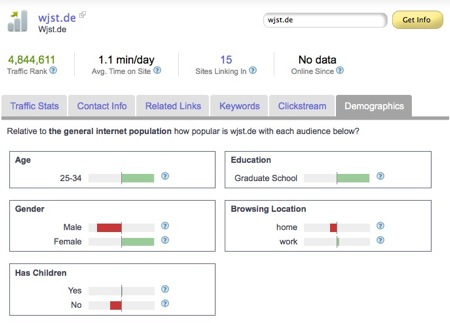was die Welt zusammen hält… Continue reading Collegium logicum
was die Welt zusammen hält… Continue reading Collegium logicum
this is at least what Alexa tells me about you – what a nonsense giving averages of so different visitors ;-)

although the profile isn’t so bad at al l…
www.cell.com/current-biology shows humour
Human emotional expressions, such as laughter, are argued to have their origins in ancestral nonhuman primate displays. To test this hypothesis, the current work examined the acoustics of tickle-induced vocalizations from infant and juvenile orangutans, gorillas, chimpanzees, and bonobos, as well as tickle-induced laughter produced by human infants.
We have learned new genomics and metabolomics (etc not to confuse with economics!) while even complete websites are now dedicated to the omics explosion. What I do not understand is the increasing omics use in completely unrelated fields like humanomics – a good or bad omen?
Being asked to give another presentation on whatesoever topic and to deposit my slides on whatsoever intranet, the famous quote of John Sweller came to my point
It is effective to speak to a diagram, because it presents information in a different form. But it is not effective to speak the same words that are written, because it is putting too much load on the mind and decreases your ability to understand what is being presented.
So, as I tend to use only slides with cartoons and figures (but no bullet points which are in my notes only) these illustrations are rather useless as a stand-alone file at any Ilias platform. In other words
if your presentation visuals taken in the aggregate (e.g., your “owerPoint deck”) can be perfectly and completely understood without your narration, then it begs the question: why are you there?
I remember a lecture by my doctoral advisor who came in the lecture room with just 1 glass slide in his shirt pocket … More intelligent comments about that issue at presentationzen.com
“the possibility does not necessarily lead to materialization”
Bert Brecht
… Ich, sagte er uns
Bin der Zweifler, ich zweifle, ob
Die Arbeit gelungen ist, die eure Tage verschlungen hat.
Ob, was ihr gesagt, auch schlechter gesagt, noch für einige Wert hätte. Continue reading Le Doubs
Frequently given answers – an article at Spiegel online has some of the answers you will need when being asked by research administratives or journalists for your work.
Please, please, please don’t try on my phone.
A quote assigned to Max Dellbrück (according to Kay’s 2000 Book of Life p194 – the letterhead of the RNA tie club). Isn’t that a wonderful MOTD? Yea, yea.
A new editorial in one of my most favorite journals now finds that immune cell signal transduction is just too complicated to be effectively queried using traditional methods and mindsets – something that I felt for some long time to be true not only for immunology for also for genetics, yea, yea.
An American team believes to describe science activity by web clicks on journal pages.
Over the course of 2007 and 2008, we collected nearly 1 billion user interactions recorded by the scholarly web portals of some of the most significant publishers, aggregators and institutional consortia.
with the conclusion Continue reading Clickstreams
Find more like this at morenewmath
Another link tip is “Cut the Not“.